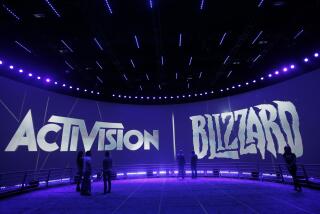Founder steps in as chief at Dell
- Share via
Dude, you’re getting a Dell -- again.
Dell Inc. said Wednesday that founder and former Chief Executive Michael Dell is retaking the helm of his namesake company in a restructuring that ousts his handpicked successor, CEO Kevin Rollins.
Dell joins a small club of entrepreneurs -- which includes Apple Inc. founder Steve Jobs -- who have returned to day-to-day operations to revive their flagging companies. Dell stepped down as CEO in 2004 but remained chairman and, famously, worked at a desk separated from Rollins only by a glass wall.
But shares in the computer maker, which rose nearly 4% to $25.16 in after-hours trading following the announcement, have slipped 17% in the last year as growth slowed and such competitors as Hewlett-Packard Co. overtook the onetime juggernaut.
It was unclear what Rollins, who did not comment, would do next.
Analysts were uncertain whether Dell would have the same effect on his company that Jobs had on Apple or even if he planned to stay in the job more than a few months. Analysts said that firing Rollins, at Dell since 1996, was a signal to Wall Street that the company was serious about regaining its dominance.
Dell’s “role is to find the new chief executive,” said Martin Reynolds of Gartner Inc. “I wouldn’t be surprised if the new chief executive comes from outside the computer industry.”
A Dell spokesman disagreed with that assessment, saying that Michael Dell is “back in the saddle.” Bob Pearson said Dell was “back for the long term. He’s very excited about it. There’s no search for the CEO.”
Dell’s return comes as the Round Rock, Texas-based company is under government scrutiny because of its stock option accounting. It is also recovering from the August 2006 recall of 4.1 million notebook computer batteries, the largest recall in consumer electronics.
Also in Wednesday’s announcement, Dell said it would miss revenue and earnings estimates in its fourth quarter, which ends Friday.
In 1984, Michael Dell founded the company in his dorm room at the University of Texas with $1,000. His idea was to bypass the middleman, the retail stores, and sell directly to customers -- first over the telephone, then online.
Through the 1990s, Dell was riding high. When archrival HP stumbled, Dell was there to capture market share.
In the last two years, Dell has been battered. Last year, HP recaptured its lost market share to become the No. 1 computer seller. Growth in the business market, where Dell has dominated, has been flat at about 5% a year. Dell has not successfully penetrated fast growing overseas markets such as China.
Most crucially, Dell’s direct sales model -- which worked for the business buyer or the tech-savvy -- misses customers interested in seeing and handling a computer before buying. The retail channels have become more efficient, matching some of the discounts consumers could get by going straight to Dell.
“Dell’s business model that propelled them to great heights is still viable,” said Tim Bajarin, principal analyst with Creative Strategies, a consultancy in San Jose. “The problem is that the mainstream consumer wants to touch and feel.”
People buying notebook computers want to be able to go into the stores. But when they get there, they don’t see anything from Dell, says Crawford Del Prete, senior vice president of IDC, a research firm in Framingham, Mass. “Notebooks are a little more of an expression of them. They want to know how much it will weigh, ‘Will I like the finish?’ HP has capitalized on the idea that this thing we carry is personal.”
While struggling, Dell is not in crisis, Del Prete said.
“They may tweak the strategy but over time this will become less of an issue as more consumers are comfortable buying direct.”
*
More to Read
Inside the business of entertainment
The Wide Shot brings you news, analysis and insights on everything from streaming wars to production — and what it all means for the future.
You may occasionally receive promotional content from the Los Angeles Times.










